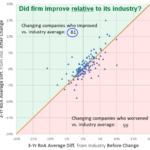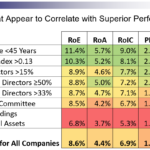The Ministry of Finance launched today public consultation on the draft rules and regulations of the Foreign Exchange and Foreign Trade Act (FEFTA). The draft rules and regulations of the FEFTA can be found at “e-Gov”. Please click here for more information.
Category: Other News
Memo to Shareholders of Kirin HD, from a Director Candidate

Independent Franchise Partners (IFP) has submitted a shareholder proposal nominating Kanako Kikuchi (an experienced global pharmaceutical executive) and myself as independent directors. Glass, Lewis supports electing both of us, but it seems that ISS has “split the baby” and only supports me. If investors could vote for Ms. Kikuchi as well, it would greatly help ensure that the board makes a fully informed, objective and independent assessment of the strategy on an ongoing basis.
Both of us have no past relations with IFP, and take an approach that is completely agnostic and independent of IFP’s dividend proposal. We both believe that if shareholders do not opt for that proposal, – or in any case – it is most prudent to withhold any decisions about the strategy until such time as when we are on the board and can ask questions and are privy to all internal analysis and confidential information. Therefore, we would both join the board with no pre-decision(s) made before knowing all the facts. This is the only logical position to take as a truly independent director. I have informed IFP in no uncertain terms that my philosophy and legal duty is to answer to all shareholders, and that I may well not agree with positions that IFP has taken or may take in the future. IFP has no problem with this.
Many investors may not realize that unless Ms. Kikuchi is elected, there will be no one with global biopharma experience on this board just at the time when that skill set is most needed. Given the company’s proclaimed strategy to “bridge” into health science products (which could be a good one for all I know), this is not wise and is of great concern to me.
A Guide to Understanding Carlos Ghosn’s “Not Guilty” Plea
by Sachiko Ichikawa
Comment by Nicholas Benes
Carlos Ghosn held a press conference on January 8, 2020 to present his “not guilty arguments” regarding the alleged crime of making, or not preventing, misrepresentations in Nissan’s Security Reports. He had already disclosed the testimony he made at the Japanese court which was considering his bail in 2019. So this was the second time that he has defended himself in public.
Mr. Ghosn spent more than one hour for his presentation, and even showed many slides and materials, but his logic for insisting on his innocence was not easy to understand. To me, his 2019 testimony in court was better than his 2020 televised presentation. In an attempt to connect the dots, this article will explain my own interpretation of what Mr. Ghosn really wanted to say.
Correlation and Causation: Good Governance Practices and Firm Performance in Japan

On December 11, 2019, I gave a lecture on BDTI’s analysis about corporate governance practices and and firm performance in Japan. Since then we have added indicators of statistical significance to our materials. To view the entire presentation as translated into English, click here: Presentation to Securities Analyst Association 2019.12.11. Those who read Japanese can read the full speech here, and can download the Japanese version of the presentation materials.
Our methodology is shown on page 23 . Our analysis suggests that the adoption of the following practices leads is followed by (appears to cause) improvements in ROA compared to the average for a firm’s industry over the next two years. Please see the charts on the left side of each page:
- Adding an nomination committee of some sort (p. 27)
- Appointing an outside director as the chair of that committee (p. 28)
- The combination of nomination committee with a board composition with >33% independent directors (p. 30)
- Adopting a performance-linked compensation plan for executives (p. 29)
Various other factors that appear to correlate with superior performance, are shown on page 22, and page 34. We will explore the direction of causation with some of these later.
Governance Practices and Firm Performance in Japan – Preliminary Analysis of Causation

On December 11, 2019, Nicholas Benes gave a lecture on Corporate Governance Practices and Firm Performance in Japan at the Securities Analysts Association of Japan. It was generally well-received and covered the following topics:
- An Introduction to BDTI
- General Trends in Corporate Governance
- Correlation Analysis on Relationships Between Corporate Governance and Firm Performance, and the Direction of Causation
- Advice for Investors and Prospects for Future Research
- Appendix: Preview of our internal corporate governance relational database
Of note were the three main themes that were discussed: (1) There are visible relationships between certain corporate governance practices and financial performance (2) the direction of causation is most important to confirm, and so far, BDTI’s analysis suggests that a number of specific governance practices actually do seem to “cause” improvement rather than simply serve as evidence that management wants to “look good”; and (3) this information is vitally useful for analysts and investors alike, in order to improve the effectiveness of investor engagement that enhances profitability, growth and stock performance in a win-win cycle.
Specialist or Generalist Education and Careers?
It’s well known in Japan that entry to good universities is fiercely competitive, and then students mess around for four years, sleeping in lectures, putting more effort into club activities than study. As a consequence, the large employers who recruit hundreds of graduates every year mainly assess applicants on character and potential, and treat new hires as “trainees” to be developed, rather than contributors.
The Need to be “Applied” in Japanese Universities
Shigenobu Nagamori, the founder of Nidec is interviewed in the Nikkei Business series on how to “wake up Japan” about his latest acquisition – not a company this time, but a university – Kyoto Gakuen. He feels that Japan has become too brand name obsessed about higher education and that 18 year olds should not have their future decided simply on the basis of their standardised score for the university entry exams.
The Cause of Japan’s Low Productivity
In the Nikkei Business series on how to “wake up Japan”, Senior Chairman and former CEO of Japanese leasing and financial services company Orix Yoshihiko Miyauchi sees three mistakes that have led to Japan’s “lost three decades”:
- Allowing an asset bubble to develop in Japan the first place
- Not stabilising the economy after the asset price crash
- Not restructuring the Japanese banking system quicker – real restructuring did not happen until the 2000s, 10 years after the crash.
As a result, Japanese companies were “like tiny boats on a big ocean,
using all their energy to avoid large waves. Rather than innovate or
grow, they focused on cost cutting”, says Miyauchi.
How Japanese Companies can Build Trust in Europe
A screencast of Pernille Rudlin’s keynote speech on the challenges facing Japanese companies in Europe – given at the Dutch Embassy/JETRO Japan business event in London in September 2019 – can be found here in English and here in Japanese on Screencast.com
The Causes of Japan’s Lost Three Decades”
The 1990s were called the Lost Decade in Japan, and then as the economy seemed to stagnate in the 2000s, it became the Lost Two Decades. Now the Nikkei Business in a recent special series seems to be saying it has been a lost three decades. Turnover and profitability were growing through to around 1990 […]
